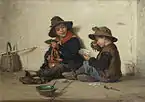Antonio Ermolao Paoletti (May 8, 1834 in Venice – December 13, 1912 in Venice) was an Italian painter, mainly of Venetian genre scenes, recalling Bamboccianti life of children and women, as well as sacred fresco work for churches in the Veneto.
Antonio's father, Ermolao Paoletti, was a well known scholar and writer of Venice. He wrote a much cited expansive guide to its architecture, monuments, artistic works, and customs. He also wrote a dictionary of Venetian dialect. He was an engraver and painter, and was a professor at the Accademia di Belle Arti in Venice.[1]
Antonio attended course in the Accademia as a pupil of Pompeo Marino Molmenti, and as a colleague of the sculptor Antonio Dal Zotto and the Armenian painter and engraver Edgar Chahine.
He displayed in various exhibitions, including Milan in 1872, where he displayed Ecco come va il vino nelle messe; at the 1884 Exhibition of Turin: Flowers for the Holy Virgin and Fa' caro al nonno!; at the 1884 Promotrice Popolana Venicena; il pesce addenti; and in 1885, Il venditore di pesce.[2]
Among his many frescoes is the main altarpiece depicting the Madonna of the Rosary with St Anthony and St Materno (1863) for the parish church of Melara.[3] Like his father, Antonio also became a professor at the Accademia.
Gallery
 Children Feeding Pigeons
Children Feeding Pigeons The Bluff
The Bluff The Melon Sellers
The Melon Sellers A Venetian Beauty
A Venetian Beauty_%C2%ABA_serenade_for_the_lacemakers%252C_Venice%C2%BB.jpg.webp) A serenade for the lacemakers
A serenade for the lacemakers
References
- ↑ Il Fiore di Venezia ossia I quadri, i monumenti, le vedute ed i costumi veneziana, (1840) represented in engravings by able artists, and illustrated by Ermolao Paoletti. Volume III, Tommaso Fontana editors.
- ↑ Dizionario degli Artisti Italiani Viventi: pittori, scultori, e Architetti., by Angelo de Gubernatis. Tipe dei Successori Le Monnier, 1889, page 349.
- ↑ Alberto Peratoner (a cura di), Dall’Ararat a San Lazzaro: una culla di spiritualità e cultura armena nella laguna di Venezia, Venezia, Congregazione Armena Mechitarista, 2006. ISBN 88-902536-0-6